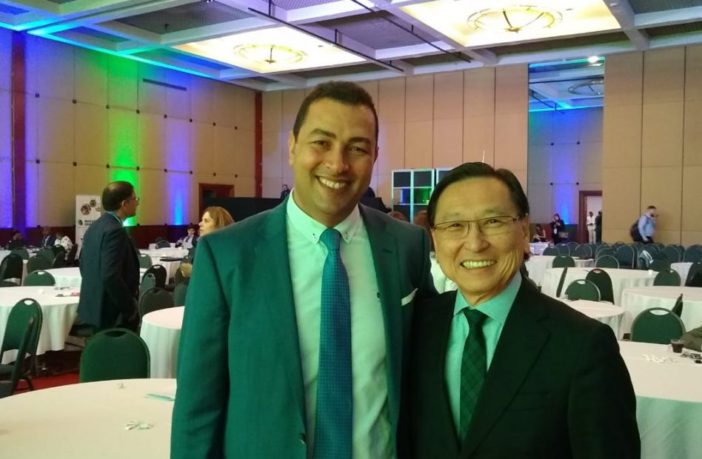The phosphate manufacturer has had operations in Brazil since 2010, and new storage facilities are expected next year, local CEO Olavio Takenaka said.
Isaura Daniel
isaura.daniel@anba.com.br
São Paulo – OCP Group, the Morocco-based fertilizer manufacturing conglomerate, is planning to add four new storage sites to its Brazil operations next year. OCP’s CEO for Brazil, Olavio Takenaka (pictured, on the right), told ANBA that warehouses will open in the states of Goiás, Minas Gerais, Pará and Santa Catarina in 2020. Takenaka attended the Brazil Africa Forum this Wednesday (13). The Group’s senior VP for East Africa, Fayçal Benameuri (on the left), was a panelist.
OCP has been active in Brazil since 2010, with operations in Paranaguá (Paraná), Rio Grande and Itaqui (Rio Grande do Sul), Rondonópolis (Mato Grosso) and Aratu (Bahia), plus two offices in São Paulo (São Paulo). Phosphate gets shipped in from Morocco to OCP’s warehouses. From there, it ships to fertilizer mixers and distributors. Apart from the units in the pipeline for 2020, there are also plans for further ones in 2021, according to Takenaka.
The company internalizes the product in Brazil to work around high costs and seaport issues. “We internalize everything so that our clients get the product just-in-time, right next to their plants,” said Takenaka. All of the phosphate sold by OCP in Brazil is imported from Morocco. “We have a line of over 50 different products, but they’re all phosphate-based,” he explains.
OCP is the biggest phosphate supplier in Brazil, and it accounts for 40% of the product’s imports to Brazil, according to Takenaka. The conglomerate owns the world’s biggest phosphate reserves, containing 500 years’ worth of product. It is investing in stepping up output in Morocco to cater to worldwide demand.
The Group owns a 10% stake in the Brazilian fertilizer company Heringer, currently undergoing court-assisted restructuring, but Takenaka declines to discuss any possible acquisition plans for the country. According to the CEO, OCP’s investment plans in Morocco exceed USD 20 billion. “So that we can increase output in Morocco and supply the world,” he says.
Takenaka notes that Brazil needs fertilizers because its soil is nutrient-poor, and that phosphate underpins agribusiness exports, which currently fetch USD 100 billion a year. “If it weren’t for fertilizers, (Brazil) wouldn’t be playing this leading role, it wouldn’t be thriving,” he argues. “We have the soil. We have water. We have sunlight –which the tropics get more of than the Northern Hemisphere. We have the technology –a highly advanced production system to supply the world –, yet our soil is poor in nutrients,” he says.
According to Takenaka, OCP intends to be present in every Brazilian state that’s relevant to agriculture, livestock farming and liquid fertilizers, so it can sell fertilizer inputs and poultry, pork and cattle feed products. “Brazil has been and will continue to be one of the fastest-growing countries in fertilizer consumption for decades,” said the CEO.
As per the OCP Group website’s Investor Relations area, the company reported USD 2.87 billion in global revenue in H1 2019, up from USD 2.86 billion in H1 2018. It also reported healthy global demand and USD 1.85 billion in gross profit, up from USD 1.83 billion a year ago, reflecting stronger revenue and lower raw material prices.
Translated by Gabriel Pomerancblum







